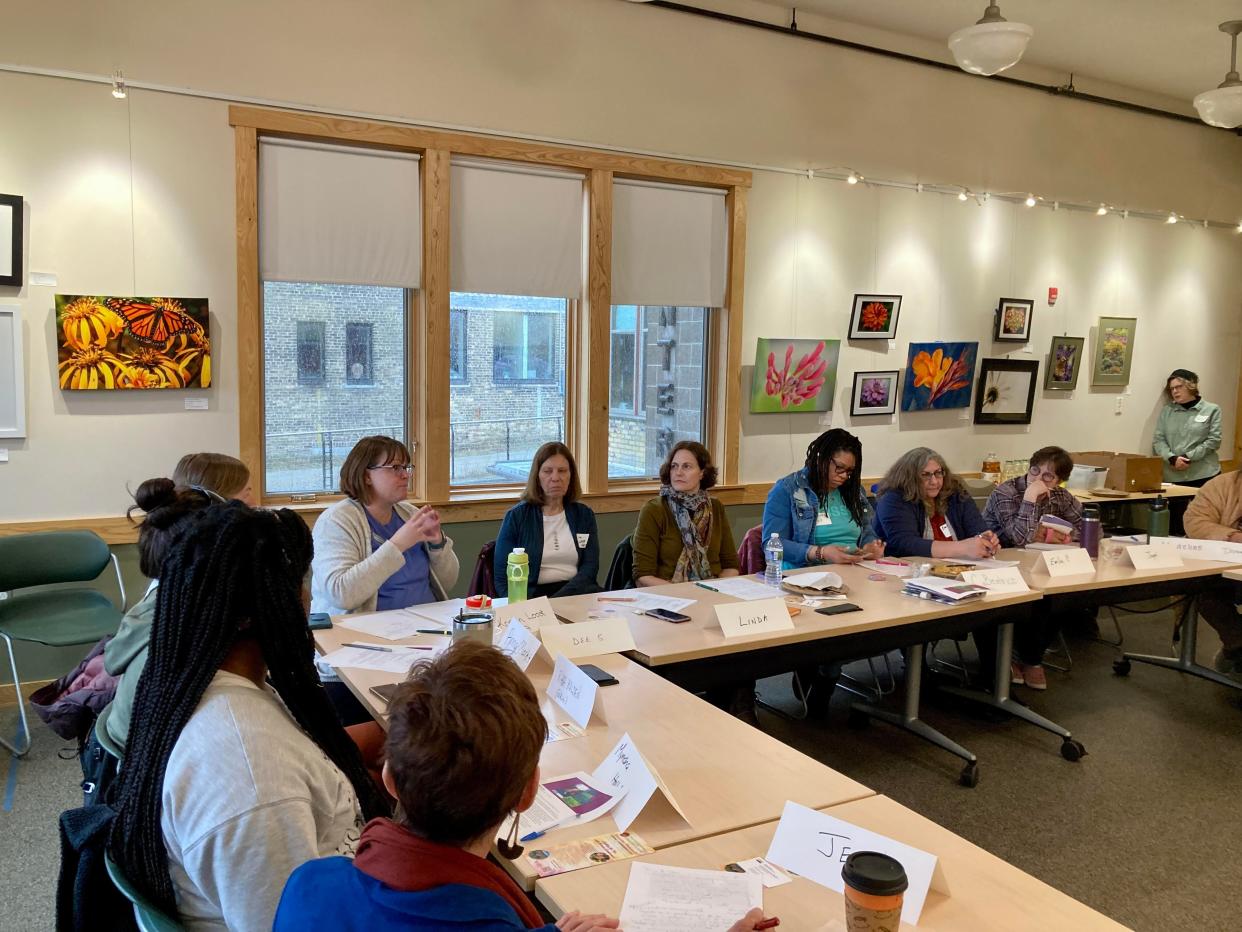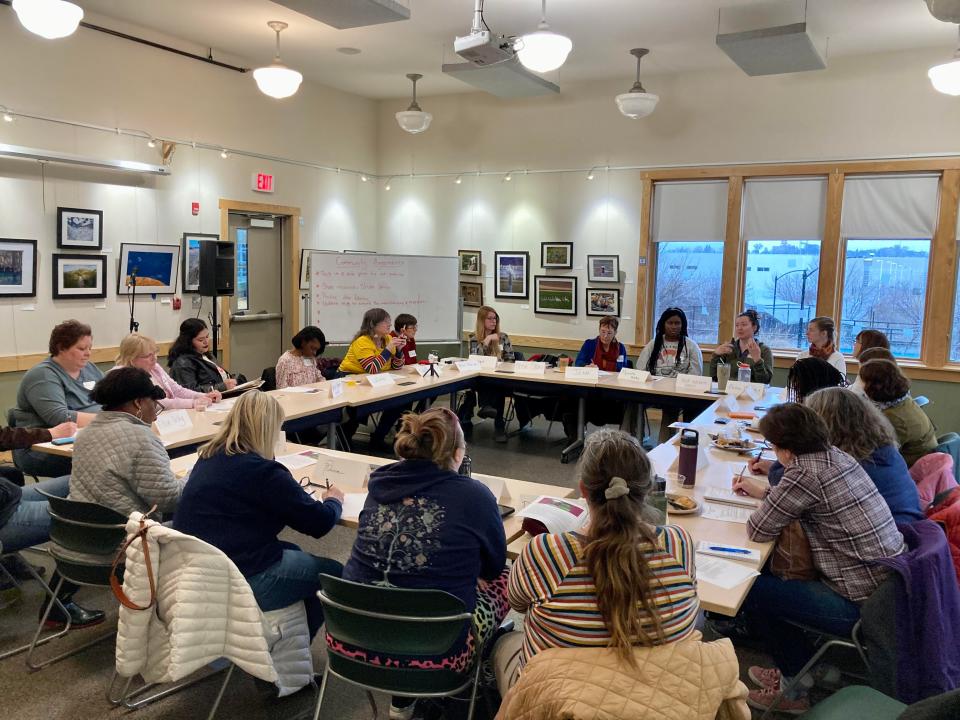Programs to help farmers often are built to men. A new conservation project is changing that.

On a rainy day in April, the women seated around a table at Milwaukee's Urban Ecology Center took nearly two hours to introduce themselves.
To some, that might sound like a nightmare. In this room, it's normal.
The shared thread between the women: They all own land. What that land looks like differs widely, from a 40-acre farm to a few acres of forest to a community garden space. But they're all interested in becoming better stewards of what they've got.
The introductions aren't just about sharing names. The women tell their goals and dreams for their land, and how it nurtures them — not the other way around.
Though it lasts a while, no one in the group shows signs of boredom, listening carefully to each other's situations. Some have inherited land they don't know what to do with, some are interested in hosting visitors for an educational experience, and still others are frustrated by problems like erosion and invasive plants.
The lengthy introduction process has a name — a learning circle — and researchers are evaluating whether the women who participate are more likely to try out conservation practices on their land once they've attended. It's part of a larger project funded by the U.S. Department of Agriculture called Wisconsin Women in Conservation, which is aimed at connecting women landowners with each other, and getting them access to conservation programs.
Many practices that help farmers take better care of their land are offered through the USDA's Natural Resources Conservation Service, or NRCS. But because farming historically has been portrayed as a male profession, that agency was built for men and has long catered to them, those who are running this project argue.
Any conservation organization that isn't putting effort into reaching women landowners is "trying to do conservation blindfolded," said Jean Eells, an Iowa-based researcher and educator of women farmers who's involved with the project. "They're only going after it with half the resources."
As the number of women farmers and landowners grows, they have a crucial role to play in protecting soil, water and the nation's food system. So, the researchers say, they need to be brought on board.
Women landowners approach conservation differently
Data shows that the traditional, patriarchal image of a farm family, for example, is getting less and less accurate. In Wisconsin, the latest U.S. Census of Agriculture found that 56% of farms in the state had a female producer — a person directly engaged in the production of agricultural products. Women were listed as the person who made the most decisions on one in five farms.
Like other under-represented producers, they've had to overcome institutional obstacles, including access to land. Although married white women were granted the right to own property by law in the 1800s, the law wasn't designed to enable a wave of women landowners. Rather, it protected husbands by preventing creditors from taking their wife's land to pay off their debt.
It wasn't until 1900 that married women had substantial control over their own property, and it wasn't until 1974 that women could apply for credit.
In 2000, a group of women farmers sued the USDA, arguing that the agency discriminated against them when distributing loans for farmland. The 2008 Farm Bill allocated more than a billion dollars for Hispanic and women farmers who alleged discrimination.
Today, women landowners still face barriers, though they may seem subtle. Rebecca Christoffel, who along with Eells conducts research on women landowners and is collecting data on the Wisconsin project, said men talk about farming and conservation in informal networking spaces like diners or co-ops. Women have said they feel closed out of such spaces.
In years of research about how women farmers and landowners get interested in conservation, Christoffel and Eells have found it differs from the approach men take. Women tend to place more value on building relationships, they said. For example, a male farmer may walk into his local NRCS office with a specific question, get it answered, and leave. A woman, on the other hand, is more likely to want to hear about certain conservation practices in context, and how they'd work together on her land.
Meaningful relationships can also help women get more comfortable with pursuing conservation in the first place, hence the learning circle model, where so much time is devoted to getting to know each other.

Their research has shown that 50% to 70% of women take an action to improve conservation on their land after a one-day meeting. That shows that "women are starved for this," Christoffel said.
Events prompt majority of women to pursue conservation
After the introductions and lunch from Milwaukee-based Vegan Soul, the women heard from Rhia Holden, a resource conservationist from a local Natural Resources Conservation Service office, and Kristin Loock, county executive director for the USDA's Farm Service Agency in Racine, Kenosha, Milwaukee and Walworth counties.
Holden talked about soil health; Loock discussed how to apply for loans for farmland.
The information was eye-opening for CaBeatrice Hart, a Milwaukee County resident who manages the green space at the Fondy Farmers Market, which serves Milwaukee's north side with fresh, locally grown food. Hart said she is transitioning to working at the organization's farm at the Mequon Nature Preserve, where farmers that have been historically disadvantaged can secure plots of land and grow food to take to the market.
It was inspiring to learn about NRCS programs that can provide both financial and technical support, she said. She also appreciated meeting other women who worked in agriculture and conservation.
"I always felt like I was the only woman doing it," Hart said.
Joann Sustachek of Union Grove said she realized one of her fellow attendees was a woman she'd long admired who runs a biodynamic farm, based on an alternative agricultural philosophy that treats the farm as an ecological system. Sustachek is starting a small farm on the remnants of her great-grandparents' homestead in Mount Pleasant.
She described her vision as a Garden of Eden-type landscape where she'll grow perennial crops, nuts, berries and herbs, creating a space where people can experience the therapeutic power of being close to the earth. She said she hopes the connections she made at the event will point her efforts in the right direction.
Since Wisconsin Women in Conservation launched in 2021, more than 2,000 women have signed up for events and a newsletter, according to its annual report from last year. It pulls support from Michael Fields Agricultural Institute, Renewing the Countryside, Marbleseed and the Wisconsin Farmer's Union and serves women in six regional networks across the state, which will increase to nine next year.
The project's funding was extended for another two years, said communications lead Kriss Marion, who runs Circle M Market Farm in the Driftless region. One of the project's primary goals is to help 50 women write conservation plans — a road map of sorts they can follow to implement practices that will protect their land. Last year 35 women wrote plans, and 68 are writing them now, Marion said.
Eells and Christoffel plan to release a case study of the first two years of the group's accomplishments. Among the data they've already collected: nearly 80% of women said they were very likely to reach out to NRCS after attending a Wisconsin Women in Conservation event.
The needle on climate issues can't be moved without taking action to protect streams and soils on private lands, Marion said, and increasingly, that will mean involving women.
"On most farms, a woman is half of the equation," she said. "We cannot afford to ignore women when we're talking about land management."
Madeline Heim is a Report for America corps reporter who writes about environmental issues in the Mississippi River watershed and across Wisconsin. Contact her at 920-996-7266 or mheim@gannett.com.
This article originally appeared on Milwaukee Journal Sentinel: Wisconsin women learning how to take better care of land they own

